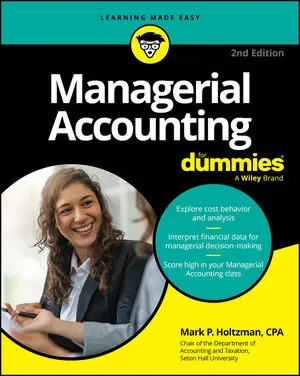Managerial accounting plays a critical role in running a business because it provides valuable information about the business to help managers make educated decisions. The process of gathering information involves
-
Analyzing costs to understand how they behave and how they will respond to different activities
-
Planning and budgeting for the future
-
Evaluating and controlling operations by comparing plans and budgets to actual results
After gathering information, managerial accountants then report the facts and figures to the company’s managers, who need this information to run the business. Here's a look at each aspect of a managerial accountant’s job.
Analyzing costs
Managerial accountants carefully collect information about a company’s costs in order to understand how costs behave. What causes costs to increase? How can the company decrease them? Managerial accounting offers many useful tools to help understand what drives costs and how different events affect net income.
For example, consider Grux Company, which manufactures grout. Every year, Grux must pay for raw materials, executive salaries, and sales commissions. The cost of raw materials varies with the volume of grout produced — the more grout you want to make, the more raw materials you need to buy.
Executive salaries are probably fixed — they don’t change at all. Sales commissions vary with the amount of sales — the more sales, the more commissions. Managerial accounting helps Grux understand how different events affect costs and how they affect the company’s profits.
Planning and budgeting
After managers set goals and strategies for a company, managerial accountants get to work developing a realistic plan — with numbers, of course — to implement these strategies and ultimately meet their goals. This budgetary process requires coordinating all of a company’s functional areas, predicting sales, scheduling production, setting up purchases, planning staff levels, forecasting expenditures, and projecting cash flows.
The end result is a budget that predicts what will happen during the next period, explicitly laid down in dollars and cents.
Evaluating and controlling operations
Planning is one thing, but execution is another. Managerial accountants are responsible for continuously monitoring performance, evaluating it, and comparing it to the budget. This part of the job is a lot like taking an occasional look at the map when you’re on a road trip to make sure you’re on the right highway and going in the right direction.
Suppose that the Busy Hardware store projects it will sell 75,000 snow shovels next winter. It orders delivery of 25,000 shovels each on December 1, January 1, and February 1. It receives its first shipment on December 1, as planned.
That December, the weather is unseasonably warm, and it doesn’t snow; no one wants to buy snow shovels. On January 1, Busy Hardware receives its second shipment. But the heat wave continues, and there’s no snow.
Carefully watching sales trends and inventory levels, Busy Hardware’s managerial accountants notice the drop in snow-shovel sales and the accumulation of 50,000 unsold snow shovels in the back of the store. After checking the weather report, they call the Purchasing department to cancel the February 1 delivery.
Carefully monitoring operations can help a company avert disaster. It can also help a company identify areas for improvement. Managerial accountants typically compare budget to actual results, investigating large differences, or variances. Understanding the nature of these variances helps managerial accountants to identify problems that need additional management attention and also can help make future budgets more accurate.
Reporting information needed for decisions
Like other accountants, managerial accountants accumulate, classify, and report information. However, they report this information internally, to the company’s own decision-makers, rather than externally, to shareholders.
The information-gathering function focuses on collecting information that is both useful for internal decision-making and also necessary for preparing external financial statements given to investors. Accordingly, managerial accountants classify revenues and costs into many different categories, for many different purposes.
They then use this information to prepare reports and other information that helps managers understand how costs behave and how management decisions will impact total costs and profitability. The same accounting information system also provides information for external financial reporting.






